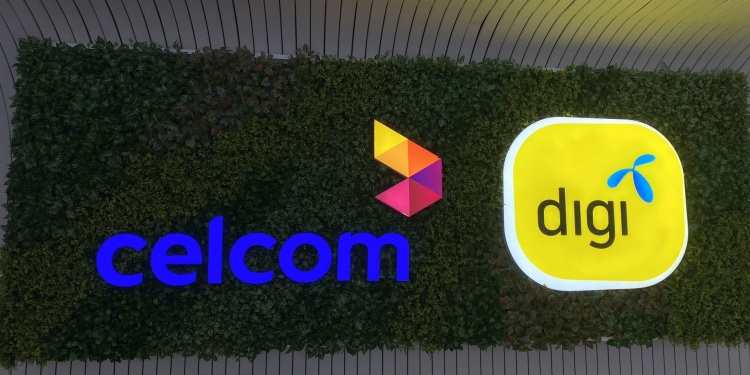Celcom and Digi have merged for nearly a year now and the merged telco is currently undergoing a massive network modernisation exercise. The network upgrade is said to be one of the largest of its kind as CelcomDigi will need to combine the Celcom and Digi sites (12,000 each) as a singular combined network to serve both customer bases. Besides faster speeds, CelcomDigi also promises wider coverage with 4G covering 98% of populated areas in Malaysia.
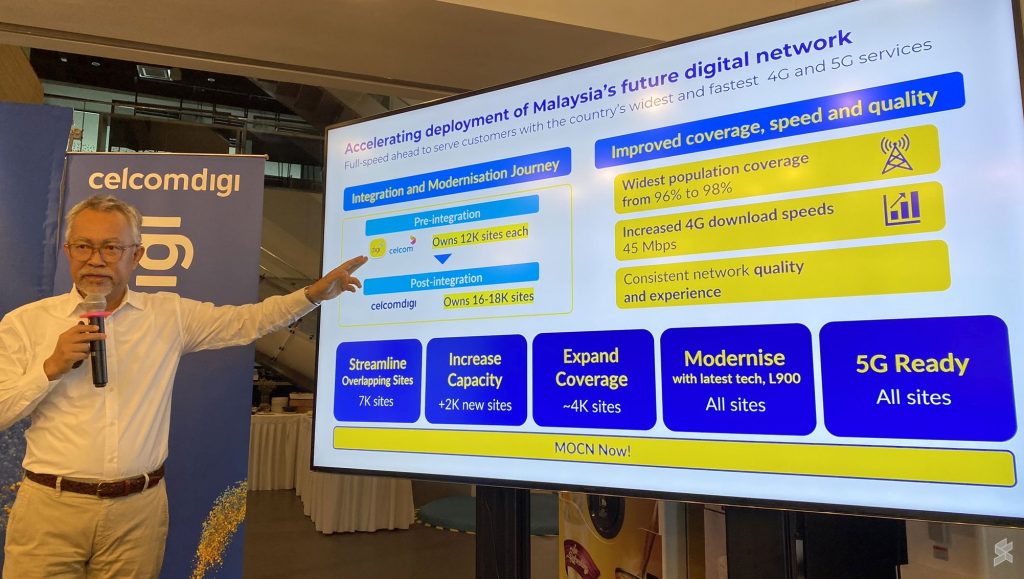
Opensignal has released a report to highlight the impact on Digi customers and how Digi has taken advantage of its new spectrum resources after its merger with Celcom. The analysis was based on data collected over three-month periods which included the period immediately after the merger and six months later.
Digi users are now accessing more spectrum assigned to Celcom
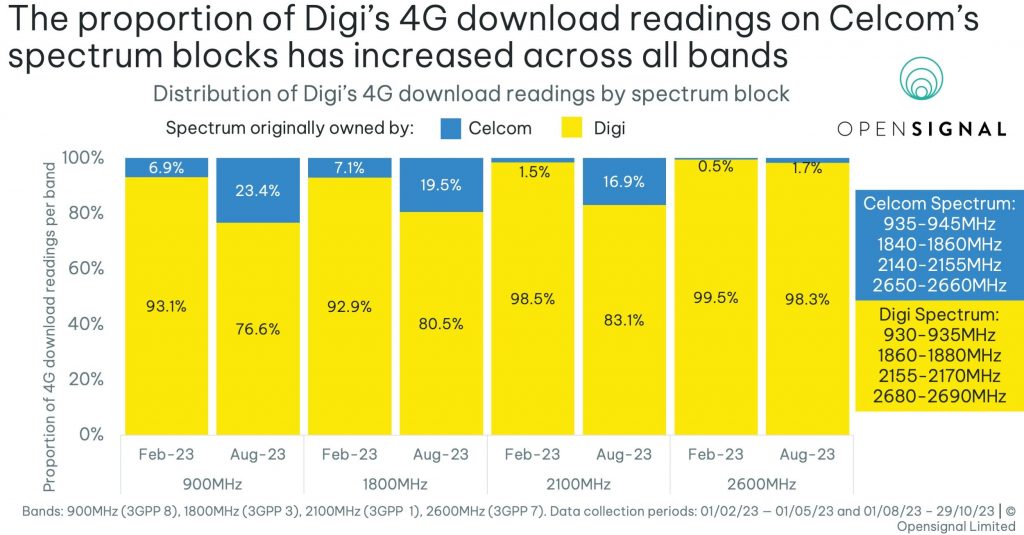
CelcomDigi has been assigned spectrum across four bands namely 900MHz, 1800MHz, 2100MHz and 2600MHz. Looking at Digi download readings and its accessed spectrum blocks, Digi customers are now accessing more of Celcom’s spectrum for 4G connectivity, especially for the lower 900MHz band.
Between February and May this year, the spectrum distribution split between Celcom and Digi spectrum for Digi 4G customers on 900MHz was 93.1% on Digi and 6.9% on Celcom. Six months later, this changed to 76.6% on Digi and 23.4% on Celcom, an indication that more Digi users are tapping on Celcom’s spectrum resource.
This is followed by the 1800MHz band where spectrum distribution of Digi customers on Celcom’s spectrum has increased from 7.1% to 19.5%. The situation is similar as well for 2100MHz with an increased distribution of Digi customers on Celcom’s spectrum from 1.5% to 16.9%.
The 2600MHz spectrum distribution of Digi customers on Celcom spectrum is quite minimal with just 0.5% back in February but it has tripled to 1.7% in August 2023.
It is obvious that the 900MHz band will have the largest proportional increase as the valuable lower band offers a wider 4G footprint and better penetration indoors compared to the 1800MHz band or higher.
Digi 4G download speeds have improved with more 900MHz spectrum capacity
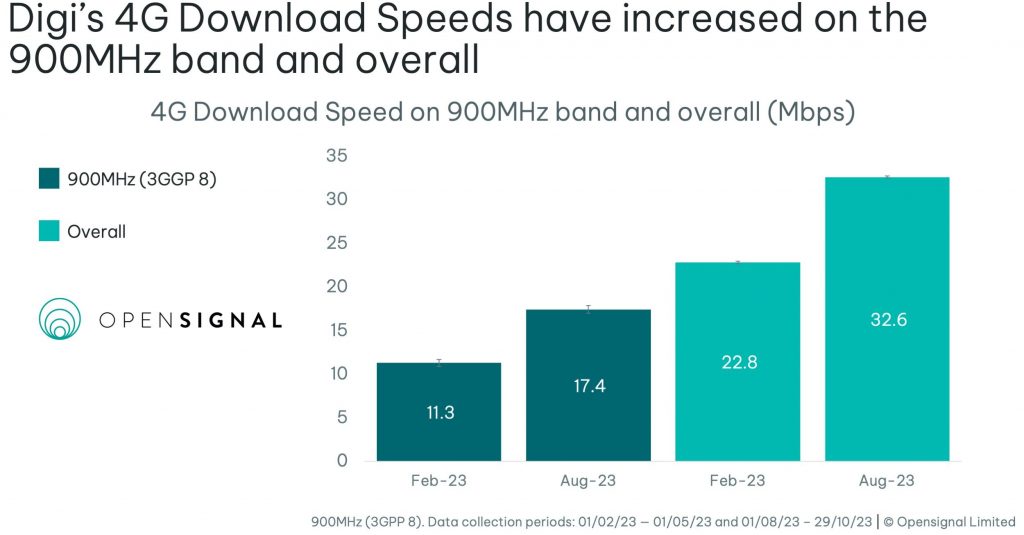
With greater access to Celcom’s spectrum, Digi customers are expected to experience better download speeds. According to Opensignal, there has been a noticeable increase in 4G download speeds on the 900MHz band. Prior to the merger, Digi only had a measly 5MHz block (930-935MHz) of 900MHz downlink bandwidth and they now have access to a wider spectrum capacity of 15MHz thanks to the additional 10MHz block (935-945MHz) from Celcom.
As shown above, the average 4G download speed on 900MHz has increased from 11.3Mbps in February to 17.4Mbps in August 2023. In terms of overall download speed, Digi has recorded an increase from 22.8Mbps in February to 32.6Mbps in August 2023.
Opensignal said the improvements on all four bands have contributed to our Digi users’ overall 4G download speeds increasing by 9.8Mbps (42.8%) on average, taking them above 30Mbps.
Slight increase in Digi user’s 4G video experience
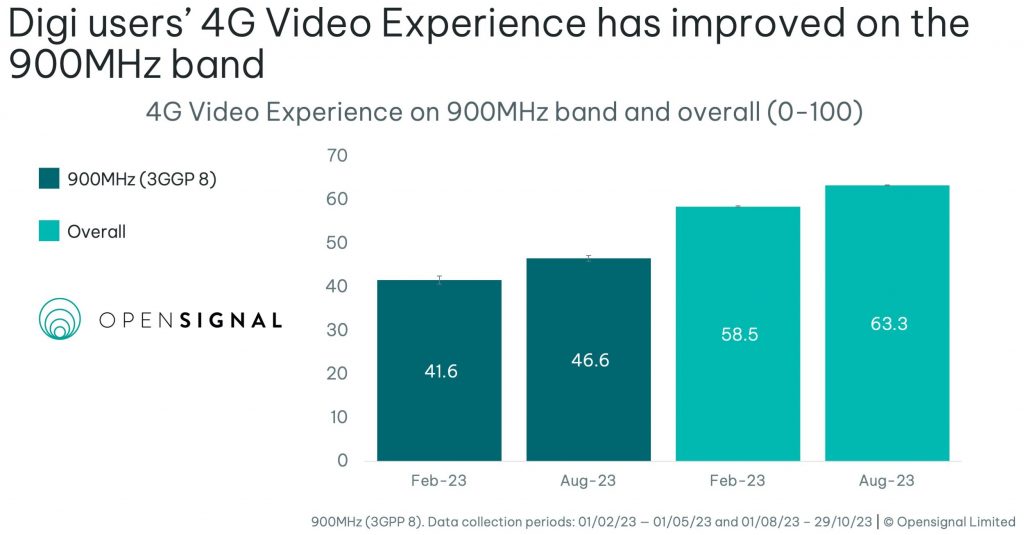
Focusing on real-world experience impact following the network merger, Opensignal has also released its findings for 4G video experience on Digi’s network. Looking at the 900MHz band again, Digi has improved its 4G video experience score from 41.6 in February to 46.6 in August 2023.
Overall with all four spectrum, Digi’s 4G video experience score has also increased from 58.5 to 63.3 which is within the “Good” category. According to Opensignal, Good rating means users on average will be able to stream video at 720p or better with satisfactory loading times and little stalling.
Opensignal remarked that network integration is not an instant process and they expect both Celcom and Digi to make full use of their combined spectrum assets. However, it noted that CelcomDigi would not be able to make use of all of its current combined spectrum in the long term. As part of its undertakings to the MCMC for the merger, CelcomDigi will need to divest 70MHz worth of spectrum over a 3-year period and the first band of divestment must happen within 2 years of completing the merger.
Even after divesting the spectrum, CelcomDigi will still have the largest slice of the pie for 4G with 150MHz worth of spectrum versus Maxis which currently has 115MHz.
CelcomDigi has teamed up with Huawei and ZTE for its nationwide network integration and modernisation project. The full-scale exercise aims at modernising the largest 4G network in Malaysia with the latest LTE and 5G-ready technologies.
You can read the full report here.
Related reading
- CelcomDigi unveils new logo 323 days after merger, but what does it mean for consumers?
- CelcomDigi’s network modernisation plans are on track, over 50Mbps download speed on merged network
- CelcomDigi embarks on major network upgrade and integration with Huawei and ZTE
- CelcomDigi users to experience wider 98% population coverage and faster speeds after network integration

